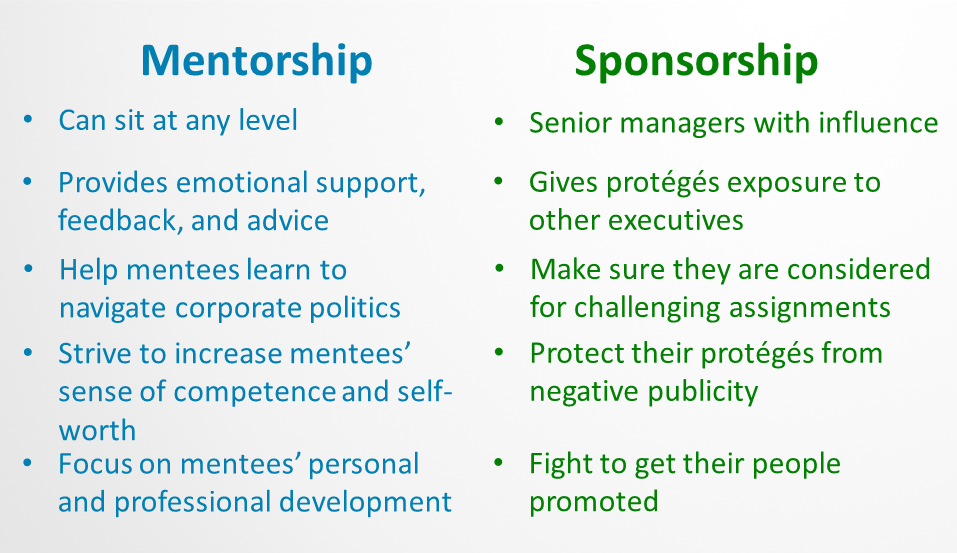Are You Overmentored and Undersponsored?
By Jo Miller, CEO of Women’s Leadership Coaching, Inc.
A few years ago, I read a compelling article in Harvard Business Review that was a game changer for me, as it opened my eyes to the value of sponsorship. The article was simply titled, “Why Men Still Get More Promotions Than Women,” and that alone ought to be enough to grab your attention.
Here’s the part that stuck in my mind:
“There is a special kind of relationship—called sponsorship—in which the mentor goes beyond giving feedback and advice and uses his or her influence with senior executives to advocate for the mentee,” wrote the authors, Herminia Ibarra, Nancy M. Carter, and Christine Silva. “Our interviews and surveys alike suggest that high-potential women are overmentored and undersponsored relative to their male peers—and that they are not advancing in their organizations.”
Sponsors are influential leaders who can open the door to new career opportunities, like promotions and coveted assignments. Mentors guide you as you navigate everyday hurdles in the workplace. While mentors help you skill up, sponsors help you move up.
So if you don’t currently have a sponsor, consider:
• Are you a high-potential woman who is overmentored and undersponsored?
• Are you less likely than your male peers to have a sponsor?
• If so, what impact would it have on your career if you enlisted the support of one or more influential sponsors?
When it comes to the impact of sponsorship, and the boost in momentum that a sponsor can add to your career, here are some facts worth knowing:
1) There’s a sponsorship gender gap.
Women are less likely than male peers to benefit from sponsorship, according to The Sponsor Effect by Sylvia Ann Hewlett with Kerrie Peraino, Laura Sherbin, and Karen Sumberg who discovered that only 13% of women and 19% of men working full-time for large companies have a sponsor. So while the gap may be smaller than you’d have guessed, it’s still significant because men advance disproportionately, ultimately outnumbering women nearly two to one in top leadership positions.
2) Sponsors empower you to make bold moves.
The authors of “The Sponsor Effect” also found that people who have the backing of a powerful sponsor are at least 22% more likely to summon the courage to ask for stretch assignments and raises. Having a sponsor is like having a career safety net, and that makes it easier to be bolder, take risks, and ask for what’s important to you. Whether it’s a pay raise, a promotion, or a plum assignment, people who ask for what they want are much more likely to get it.
3) Sponsors enhance your career satisfaction.
How happy are you, right now, with the pace of your career growth? According to the authors of “The Sponsorship Effect”, women (and men) feel more satisfied with their career advancement when they have sponsors. If you feel like your career has plateaued or that you’re being overlooked for opportunities, a sponsor can help.
4) Sponsors transfer power to their protégés.
When reporting on sponsorship research conducted by The Center for Talent Innovation, Jenna Goudreau wrote for Business Insider, “Four U.S.-based and global studies clearly show that sponsorship—not mentorship—is how power is transferred in the workplace.” If women are less likely to be sponsored than their male colleagues, then it’s no surprise that it’s more difficult for women to gain influence. Whether your goal is to launch a new product, turn around a struggling team or ascend to the C-suite, having an influential ally in your corner makes it easier.
5) You’re underestimating the benefits of sponsorship.
Here’s one final nugget of information from the research referenced in “The Sponsor Effect”: “We found that the majority of ambitious women underestimate the pivotal role sponsorship plays in their advancement—not just within their current firm, but throughout their career and across their industry.” Are you an ambitious woman? Then it’s likely that you too are underestimating the benefits sponsorship can confer on your career.
Check out tomorrow’s post on how to get the attention of a sponsor!
_____




